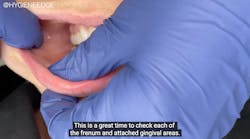Empathy in the face of uncertainty: A hygienist's guide to difficult conversations
Dental hygienists are frontline guardians of oral health, positioned to identify subtle changes that could point to larger health issues, including oral cancer. Let's emphasize our diagnostic abilities and crucial role in providing compassionate support to patients facing life-altering diagnoses. This requires a combination of clinical expertise, deep empathy, and a commitment to understanding a patient’s emotional journey.
Imagine this scenario: during a routine appointment, you notice a white patch, a nonhealing ulcer, or a suspicious lump in a patient's mouth. These findings can be alarming for you and your patient. While many oral lesions are benign, the possibility of something more serious looms large. In this moment, your choice of words and demeanor can profoundly impact the patient's experience.1,2
Understand empathy, sympathy, and compassion
In health care, it’s crucial to understand the distinctions between empathy, sympathy, and compassion. While there's no single definition of empathy, it's generally understood as the ability to grasp another person's emotions and perspective.3 Sympathy involves feeling concern or pity for someone's hardship. Compassion takes it further, combining these feelings with a desire to actively help. In essence, empathy is about understanding, sympathy is about feeling, and compassion is about acting.4
Empathy as the foundation
Before launching into explanations or referrals with the patient, acknowledge their emotions. A simple phrase such as, "I understand this may be concerning," or "It's OK to feel worried" can make a big difference. Remember, they may be experiencing shock, fear, or denial. By showing empathy, you create a safe space for them to process their reactions.5
Clarity and compassion
Avoid minimizing the situation or using technical jargon. Explain your findings in clear, relatable terms. Let the patient know that they need further evaluation with an oral pathologist. This doesn’t necessarily mean a malignancy, but it’s the most responsible step to rule out serious concerns.
Allow for processing and support
Even when you carefully explain things, a patient might feel overwhelmed. Give them time and space to process the information, and then ask questions later. Let them know you're available to address further concerns after the initial shock wears off. Avoid rushing them into decisions or minimizing their worry.
Your support becomes even more critical if the oral pathologist confirms oral cancer. Continue to offer empathy, validate their emotions, and connect them with informational and support resources. Empowering them with knowledge while offering emotional support can significantly improve their ability to cope with the challenges ahead.
The lasting impact of your care
Your sensitivity, empathy, and support throughout the diagnostic process can significantly impact the patient's journey. Treating them with compassion and understanding makes you an invaluable ally during a frightening and vulnerable time.
Remember, compassion means offering help and support rooted in an emotional bond. It's about genuinely caring for the person in front of you. Genuine acceptance means seeing and embracing the individual without preconceived ideas or stereotypes while creating an environment of trust and understanding.6 It means respecting the patient's decisions about their oral health and understanding their fears, even when they're afraid of hearing an unfavorable diagnosis.7
Author’s note: While models such as ABCDE and SPIKES provide guidance for delivering difficult news, I focused on a compassion-empathy approach because dental hygienists are not typically the providers responsible for breaking bad news. Hopefully, this will better equip hygienists to support patients after difficult news.
References
1. Chauhan N. A wrong diagnosis. Indian J Cancer. 2020;57(2):212-215. doi:10.4103/ijc.IJC_418_19
2. Curtin S, McConnell M. Teaching dental students how to deliver bad news: S-P-I-K-E-S model. J Dent Educ. 2012;76(3):360-365.
3. Güneri P, Epstein J, Botto RW. Breaking bad medical news in a dental care setting. J Am Dent Assoc. 2013;144(4):381-386. doi:10.14219/jada.archive.2013.0131
4. Rohani C, Sedaghati Kesbakhi M, Mohtashami J. Clinical empathy with cancer patients: a content analysis of oncology nurses' perception. Patient Prefer Adherence. 2018;21(12):1089-1098. doi:10.2147/PPA.S156441
5. Sanders JJ, Dubey M, Hall JA, Catzen HZ, Blanch-Hartigan D, Schwartz R. What is empathy? Oncology patient perspectives on empathic clinician behaviors. Cancer. 2021;127(22):4258-4265. doi:10.1002/cncr.33834
6. Arboleda LPA, Pereira TCE, Epstein JB, et al. Clinical and psychosocial impact of communication about oral potentially malignant disorders: a scoping review. Dent J (Basel). 2023;11(9):209. doi:10.3390/dj11090209
7. Moudatsou M, Stavropoulou A, Philalithis A, Koukouli S. The role of empathy in health and social care professionals. Healthcare (Basel). 2020;8(1):26. doi:10.3390/healthcare8010026
Andreina Sucre, MSc, RDH, is an oral pathology and oral surgery specialist, and a practicing dental hygienist in South Florida. She’s a speaker, writer, and advocate for early pathological diagnosis. Andreina was born in Venezuela where she earned her dental degree in 2002 from Universidad Santa Maria. In December 2005, she earned her certificate and specialization degree in oral pathology and oral surgery from Pontificia Universidad Javeriana, in Colombia. Follow her on Instagram @ThePathoRDH.
About the Author

Andreina Sucre, MSc, RDH
Andreina Sucre, MSc, RDH, is an international dentist, oral pathology, and oral surgery specialist practicing dental hygiene in Miami, Florida. A passionate advocate for early pathological diagnosis, she empowers colleagues through lectures focused on oral pathologies. Andreina spoke on this topic at the 2024 ADHA Annual Conference, 2023 RDH Under One Roof, and she writes about oral pathology for RDH magazine. Committed to community outreach, she educates non-native English-speaking children on oral health and actively volunteers in dental initiatives.


